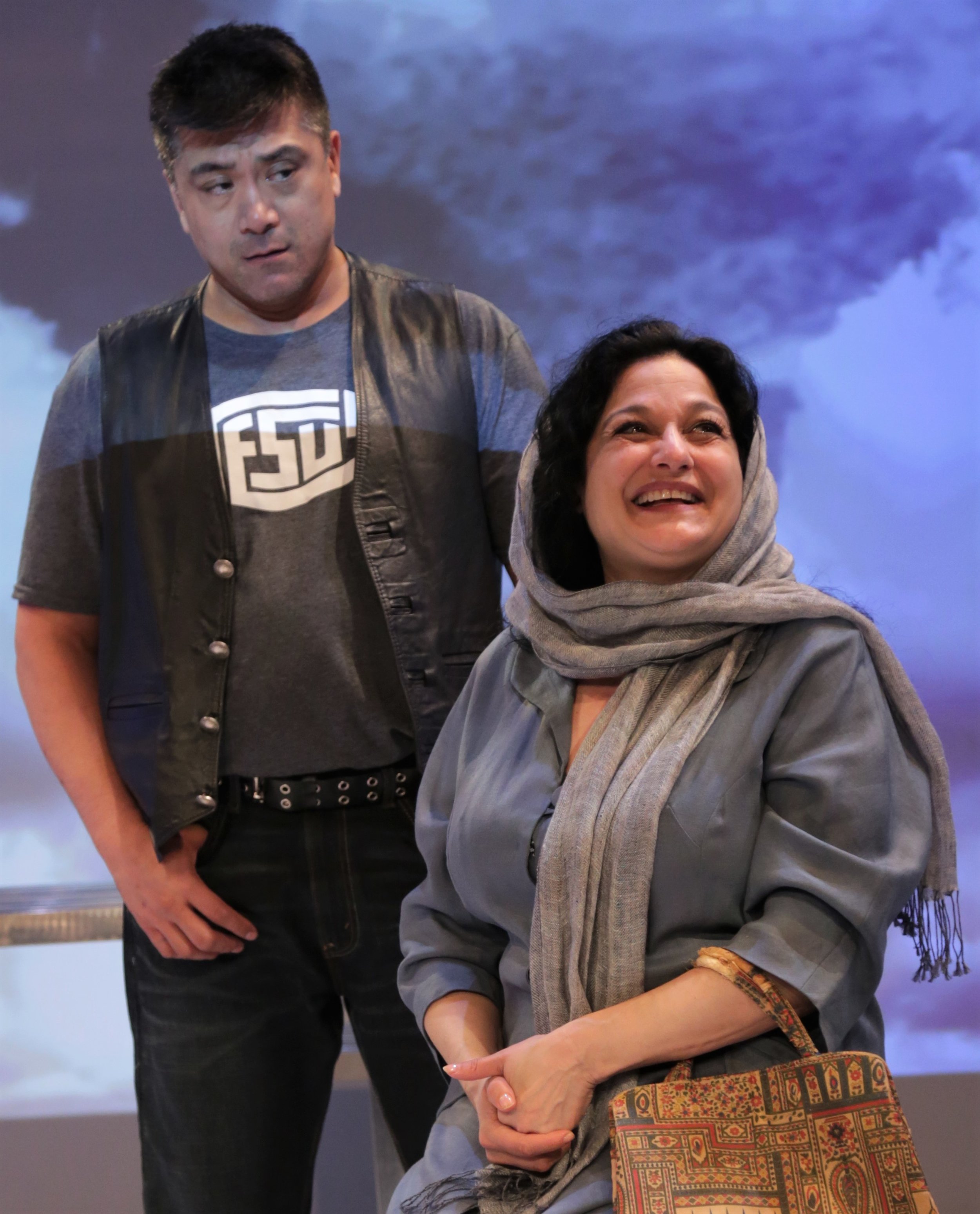Robert Patrick, one of the pioneers of the Off-Off-Broadway movement in the 1960s, was a prominent member of the legendary Caffe Cino, which cultivated the talents of playwrights such as Lanford Wilson, William M. Hoffman, Doric Wilson, and many others. Patrick’s The Haunted Host (1964), Indecent Exposure (1966) and The Warhol Machine (1967) all premiered at the Greenwich Village venue, and his play Kennedy’s Children (1975) was a critical hit on Broadway. The Phoenix Theatre Ensemble deserves credit, then, for reviving Patrick’s Judas (written in 1973), under the direction of Craig Smith. Alas, this exceedingly earnest but unremarkable production is not likely to cause a Robert Patrick renaissance.
Judas is a modern-dress version of the final days of Judas Iscariot. The play begins with a CEO-like Pontius Pilate (Smith, who also directed), gazing out on Jerusalem from his office windows. There is unrest in the air, and his officious assistant, Klautus (Josh F.S. Moser) informs him that a jittery King Herod (Jim Sterling) needs Pilate’s help. Herod has good reason to be nervous. The rabble wants to tear him to shreds for his involvement in the execution of John the Baptist. Pilate absolves Herod in the name of Rome, but it does not matter. The crowd tears Herod to shreds anyway.
Josh F.S. Moser (left) as Klautus and Craig Smith as Pontius Pilate in Judas. Top: Smith with Josh Tyson (left) as Judas. Photographs by Gerry Goodstein.
Providing a beacon of hope in these divisive times is Judas (Josh Tyson), Pilate’s young protégé. Pilate is grooming his charge for a position of leadership, offering guidance in the principles of good governing. Diversity is harmful to the State, Pilate philosophizes, and all races, religions, tribes must come together under one sovereignty, Rome. Judas is torn because he desires something more spiritually meaningful than nationalism. Fortuitously, he will find this through the teachings of Jesus (Jeffrey Marc Alkins).
Patrick’s play recounts all the expected episodes in Judas’s passage from Christ worshipper to betrayer, and the drama gives stage time to all of the familiar figures, including Mary (Elise Stone), Joseph (Craig Anthony Bannister), and the Apostle Peter (Ariel Estrada). The play’s most compelling idea is that Judas and Peter, who are often assumed to be weak at best and villainous at worst, are themselves victims of fate and simply fulfilled their roles in the scriptural prophesy. After all, even if they wished to be honorable (as the play suggests they did), had they not betrayed or denied Jesus, then their Lord would have been a false prophet.
Unfortunately, other than this heady paradox there is not a great deal that challenges expectations or brings anything new to what already has been presented in countless other depictions of the Judas narrative. The production makes use of loud rock music before and after the long two acts, but this is the only irreverent touch. The material cries out for radical treatment in the current contentious atmosphere.
The actors are generally strong and do their best to enliven some of the ponderous scenes. As Judas, Tyson nicely captures the youthful anguish and existential longing that were hallmarks of plays from the 1970s. Craig’s Pilate is fatherly and likable, which adds to the character’s insidiousness. As Jesus and Mary, Alkins and Stone bring humanity and strength of conviction to their characters. Their dogged determination gives credence to Pilate’s forewarning, “Men do not die for their beliefs. They die from them.”
Ariel Estrada (left) plays Peter, and Elise Stone is Mary.
Aside from Debbi Hobson’s well-chosen contemporary costumes, which range from corporate to grunge, the design elements do not serve the play well. The production makes liberal use of projections (created by Attilio Rigotti) that are cast onto large white screens surrounding the stage. These include images of a gleaming contemporary Jerusalem skyline, a verdant Gethsemane, and an abstract design denoting the home of Mary and Joseph. The shadows and light from the projections often wash over the actors, thereby psychedelically obscuring their faces and bodies.
Near the end of the play Judas gives Jesus a long-awaited kiss. Like much that has come before, it is disappointingly demure.
The Phoenix Theatre Ensemble production of Judas runs through May 13 at The Wild Project (195 East 3rd St., between Ave. A and Ave. B). Evening performances are at 8 p.m. Tuesday through Saturday, and at 2 p.m. on selected Wednesdays and Saturdays. For tickets and information, call Ovation Tix at (212) 352-3101 or visit www.PhoenixTheatreEnsemble.org.





